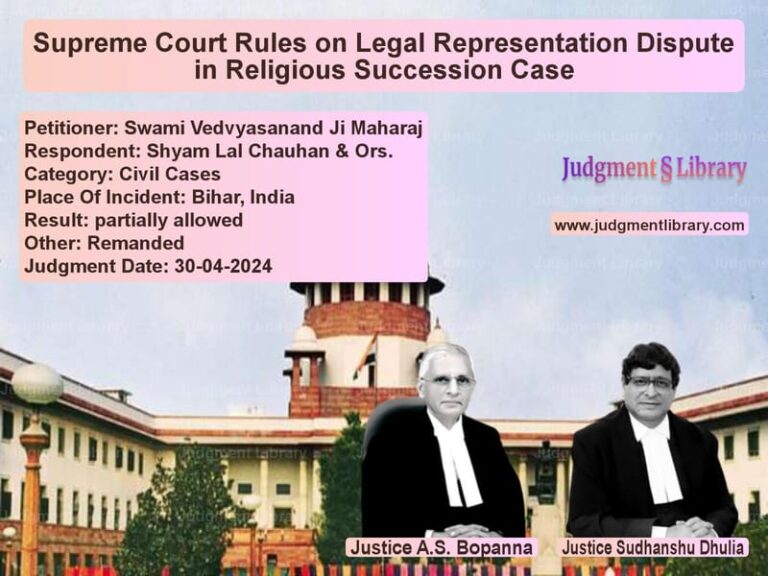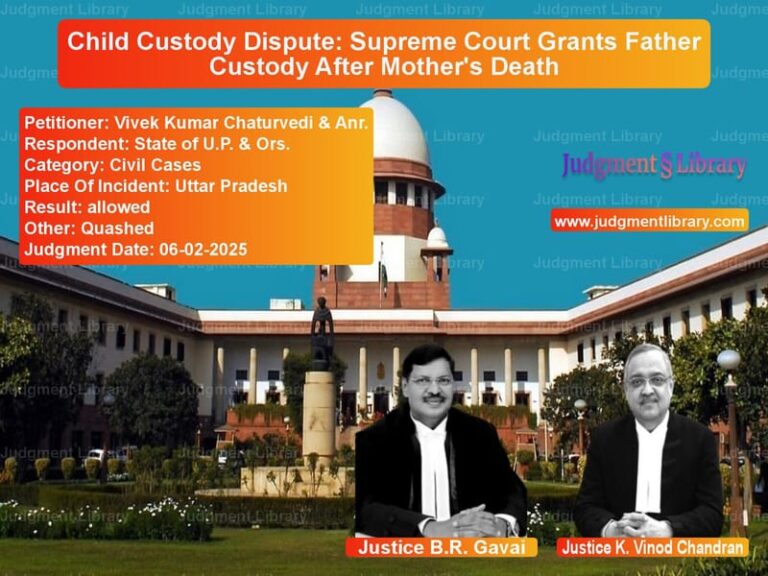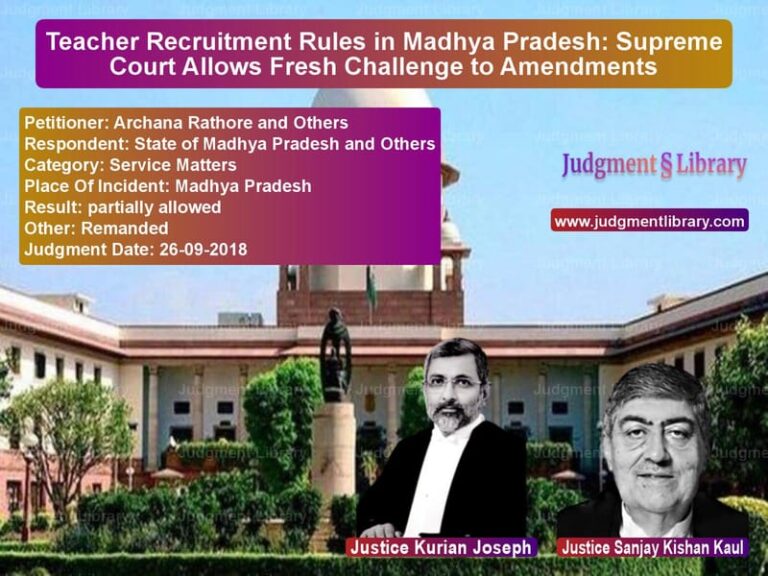Illegal Appointment and Natural Justice: Supreme Court Ruling on Nullity in Government Jobs
The case of Union of India & Anr. v. Raghuwar Pal Singh deals with the question of whether an appointment made without the approval of a competent authority is a nullity or a mere irregularity, and whether such an appointment can be terminated without granting an opportunity of hearing to the affected person.
The case concerns the appointment of the respondent, Raghuwar Pal Singh, to the post of Veterinary Compounder in the Department of Animal Husbandry and Dairying. His appointment was made in November 1999 by an officer who was merely authorized to look after current duties. The appointment was later canceled in August 2000 on the ground that it was made without the approval of the competent authority. Singh challenged this termination before the Central Administrative Tribunal (CAT), which upheld the government’s decision. However, the Rajasthan High Court reversed the order, ruling that Singh was entitled to a hearing before termination. The matter then reached the Supreme Court, which ultimately upheld the CAT’s decision, stating that an appointment made without authority is void ab initio and does not require prior notice before cancellation.
Background of the Case
The sequence of events leading to the dispute is as follows:
- On November 1999, Raghuwar Pal Singh was appointed as a Veterinary Compounder.
- His appointment was made by the then Director Incharge, H.S. Rathore, an Agriculture Officer who was not competent to make such appointments.
- The selection process did not follow proper procedures, and the approval of the competent authority was not obtained.
- On August 29, 2000, the appointment was canceled through an office order issued by a duly appointed Director, citing the lack of approval and procedural irregularities.
- Singh challenged the termination before the CAT, arguing that his appointment was valid and that he had not been given a hearing before his dismissal.
- The CAT dismissed his claim, holding that his appointment was illegal and void ab initio.
- Singh then approached the Rajasthan High Court, which ruled in his favor, stating that termination without a hearing was arbitrary and violated principles of natural justice.
- The Union of India challenged the High Court’s ruling before the Supreme Court.
Arguments by the Petitioner
The Union of India, representing the government, argued:
- The appointment of Singh was illegal as it was made without the approval of the competent authority, which was a mandatory requirement under the relevant rules.
- The selection process itself was flawed, as it was conducted by an improperly constituted board led by an officer who did not have the authority to make appointments.
- Singh was related to the officer who appointed him, raising serious concerns about nepotism and bias.
- Since the appointment was void ab initio, there was no requirement to provide a hearing before terminating it.
- The High Court failed to consider that Singh never acquired a legal right to the position due to the fundamental illegality of his appointment.
Arguments by the Respondent
Raghuwar Pal Singh contended:
- His appointment followed due process as he was selected based on a public advertisement.
- He had been working in the position for nearly a year before being terminated without any inquiry or notice.
- The principles of natural justice required that he be given an opportunity to defend his appointment before being dismissed.
- The appointment, even if irregular, was not void but only defective, which could have been rectified instead of outright cancellation.
Central Administrative Tribunal’s Ruling
The CAT dismissed Singh’s petition, holding that:
- The appointment was made without authority and was therefore void ab initio.
- The officer who appointed Singh was not competent to do so and had ignored essential recruitment procedures.
- The requirement of prior approval from the competent authority was not a mere formality but a legal necessity.
- Since the appointment was a nullity, the principle of natural justice did not apply, and there was no requirement to hold a hearing before cancellation.
High Court’s Decision
The Rajasthan High Court overturned the CAT’s decision, reasoning that:
- The termination order only mentioned that the appointment was made without approval but did not specify any wrongdoing on Singh’s part.
- The government had argued additional grounds before the CAT that were not stated in the termination order.
- As Singh had worked in the post for nearly a year, he had a right to be heard before being dismissed.
- The government’s action was arbitrary and violated the principles of natural justice.
Supreme Court’s Analysis and Verdict
The Supreme Court overturned the High Court’s ruling and reinstated the CAT’s decision. The Court reasoned:
- The requirement of obtaining approval from the competent authority was not a procedural formality but a substantive legal requirement.
- Since the appointment was made without authority, it was null and void from the beginning.
- A void appointment does not create any legal rights, and therefore, there was no requirement to provide a hearing before termination.
- The High Court erred in ignoring the fundamental illegality of the appointment and focusing solely on procedural fairness.
- “Those who come by the back door must leave by the same door.” The Court cited earlier rulings emphasizing that illegally appointed persons cannot claim equity or natural justice.
Key Takeaways
- An appointment made without the approval of a competent authority is void ab initio and does not require a hearing before cancellation.
- The principles of natural justice do not apply in cases where an appointment is fundamentally illegal.
- Recruitment rules must be strictly followed, and any deviation can render the appointment null and void.
- The Supreme Court reaffirmed that courts should not grant relief to individuals who have obtained appointments through irregular or unauthorized means.
Conclusion
This case serves as a precedent in employment and administrative law, reinforcing the principle that appointments made without legal authority are nullities and cannot confer any rights on the appointees. The Supreme Court’s ruling underscores the importance of following recruitment rules and obtaining proper approvals before making government appointments.
The judgment also clarifies that while procedural fairness is essential, it cannot override substantive legal requirements. Any person securing a government job without following due process cannot later claim protection under the principles of natural justice when their appointment is rightfully terminated.
Petitioner Name: Union of India & Anr.Respondent Name: Raghuwar Pal SinghJudgment By: Justice Dipak Misra, Justice A.M. Khanwilkar, Justice D.Y. ChandrachudPlace Of Incident: Suratgarh, RajasthanJudgment Date: 13-03-2018
Don’t miss out on the full details! Download the complete judgment in PDF format below and gain valuable insights instantly!
Download Judgment: Union of India & Anr vs Raghuwar Pal Singh Supreme Court of India Judgment Dated 13-03-2018.pdf
Direct Downlaod Judgment: Direct downlaod this Judgment
See all petitions in Employment Disputes
See all petitions in Termination Cases
See all petitions in Public Sector Employees
See all petitions in Judgment by Dipak Misra
See all petitions in Judgment by A M Khanwilkar
See all petitions in Judgment by Dhananjaya Y Chandrachud
See all petitions in allowed
See all petitions in Quashed
See all petitions in supreme court of India judgments March 2018
See all petitions in 2018 judgments
See all posts in Service Matters Category
See all allowed petitions in Service Matters Category
See all Dismissed petitions in Service Matters Category
See all partially allowed petitions in Service Matters Category







